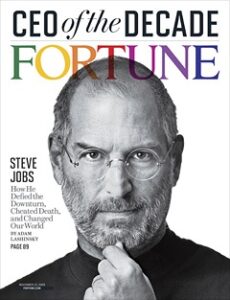What We Shouldn’t Learn From Steve Jobs
 I don’t know about you, but I am developing a major inferiority complex as I contemplate the achievements of Steve Jobs. In a decade that has been punishing and humbling for most CEOs, Steve has conjured victory after victory from the whole cloth of his vision, imagination, and singular focus on excellence. I am in complete agreement with Fortune Magazine’s assessment that he is the “CEO of the Decade.” — I was already taking note back in 2004.
I don’t know about you, but I am developing a major inferiority complex as I contemplate the achievements of Steve Jobs. In a decade that has been punishing and humbling for most CEOs, Steve has conjured victory after victory from the whole cloth of his vision, imagination, and singular focus on excellence. I am in complete agreement with Fortune Magazine’s assessment that he is the “CEO of the Decade.” — I was already taking note back in 2004.
When confronted with a problem, a new favorite question of CEOs is: “What would Steve do?”
Don’t get me wrong — there will be many useful lessons from the Steve Jobs/Apple repertoire — I expect a few great books will take on the task of revealing them. So I’ll leave that to others. But let’s ask another question — what shouldn’t we learn from Steve Jobs?
1) His lessons don’t work in business to business environments. Apple innovates for consumers who do not have complex systems problems and who don’t talk back. Steve likes to do it his way without interference or meddling. His strategy breaks down when he has to cooperate with others or make compromises for customers, or develop products that must fit into a wider, systemic world. You’ll see evidence of this as Apple tries to negotiate with a widening set of independently-minded wireless service providers.
2) His approach wouldn’t work for complex products. Remember that Apple doesn’t make many products — six Macs, four iPods, two IPhones, and Apple TV — that’s it. If Apple tried to build a car, it would take it three years just to design the dashboard. Now it would be an extraordinary dashboard, but Job’s fabled micro-management would stall the delivery of a finished automobile.
3) Apple’s fear-based management style wouldn’t fit in people-intensive businesses. You couldn’t run Accenture, Cap Gemini, or the U.S. Department of Commerce with the confrontational, “…you’re not very smart/I’m going to fire you” Apple approach (well documented in another great Fortune article).
4) Steve is not just any CEO. Years ago I invited Steve to speak at a Forrester Forum, Our audiences are famously demanding. But when he walked on stage, everyone in the room melted — he could have asked them to take off their clothes and they would have willingly complied. Steve has three assets that 99.9999% of all CEO will never have: 1) he is famous, 2) he has historically re-invented industries, and 3) he has formidable charisma. In other words, the guy is a one-off, with a history and set of skills that are rare and unteachable.
5) Apple is in a highly-specialized industry. Many of the Jobs lessons around design, speed, innovation, research, and development are not applicable to a wide array of businesses. It’s doubtful if the brand manager for Cheerios or the supervisor of a Dupont chemical plant can gain much inspiration from the Apple story.
There are many positive lessons to learn from Steve and Apple. But let’s apply those lessons where they are relevant and in context.
If you’ve got any stories or observations about what Apple can teach and not teach, I’d love to get your comment.
